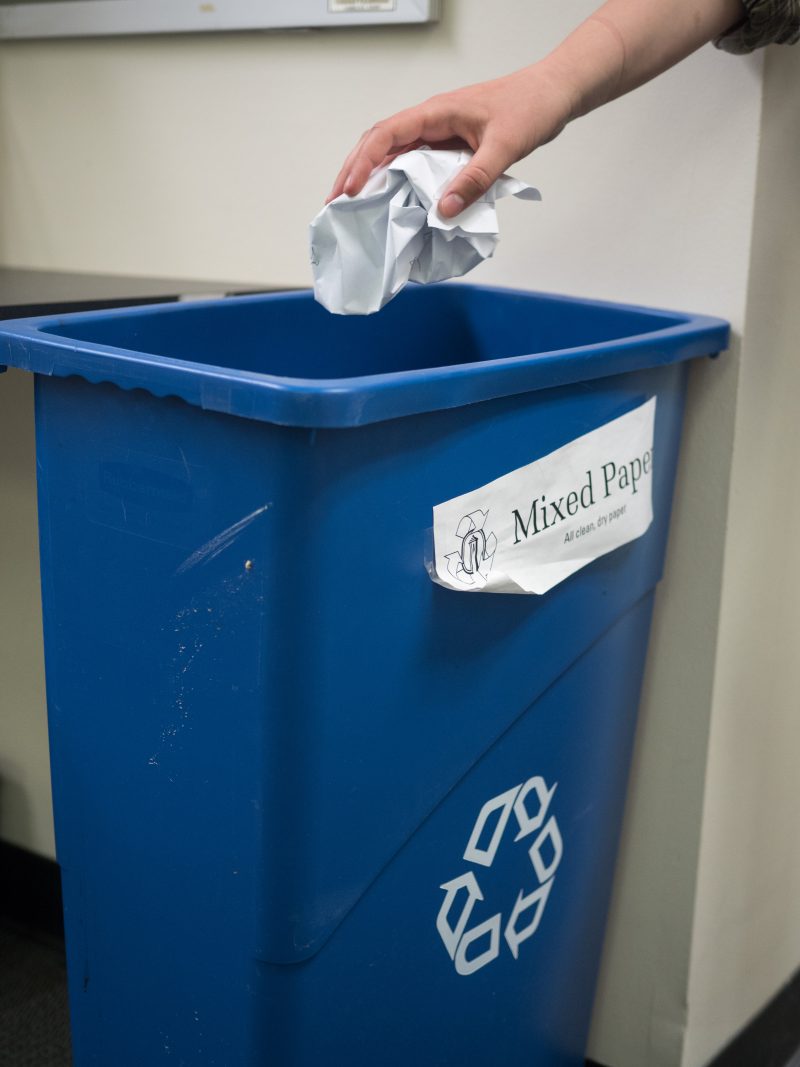Campus Planning and Sustainability is in the process of transitioning residence hall recycling bins to a ‘dual stream’ recycling program.
Instead of separating paper, cardboard, aluminum and plastic, students will be able to recycle aluminum, plastic and glass in one bin. Paper and cardboard will still have to be separated. The program will also introduce glass recycling into residence halls.
The change comes due to the inefficiencies of the previous method. Only 12.3 percent of all waste was recycled during the fiscal year of 2016–2017. According to Sharon Curry, sustainability coordinator, this number has room for improvement, especially since during the 2016–17 RecycleMania, a campus-wide recycling challenge, 19.6 percent of waste was recycled.
“We are seeking to find the program that is the best fit for our campus. We want a program that is convenient for the community and cost-effective for the university, as well as sustainable in our constantly-changing local recycling services market. Additionally, we want to consider sustainable materials management and waste minimization best practices,” Curry wrote in an email interview. “The goal is to transition the entire campus during the spring semester.”
Monica Lampton, sophomore student assistant of Campus Planning and Sustainability, explained why it is important that recyclables are sorted correctly.
“If residents do not sort their recycling properly, there is no secondary sorting. This means that if the recyclables are not sorted properly into the correct bins, then the bin is considered ‘contaminated,’ and will not be counted as recyclable material and will be sent to a landfill,” Lampton said. “It is highly important that students properly sort their recyclable materials.”
The new sorting method does not change what qualifies for recycling.
“Anything organic, like food, is not recyclable and should be placed in the trash, including recyclable materials that have organic material on them, like pizza boxes and to-go containers that haven’t been cleaned,” Lampton said.
Lampton also provided insight into why recycling is important in the first place.
“A lot of the materials we use are very harmful to the environment to make in the first place but tend to be necessary,” Lampton said. “In order to reduce the amount of impact we have on the environment, we can recycle all the materials that are allowable.”
Lampton explained how recycling, and knowing what can or cannot be recycled, can positively affect the environment.
“An example of this is paper. In order to make paper, we must cut down trees and turn them into paper materials. This, obviously, kills trees, which in turn negatively affects the environment, as they are essential to environments and also, you know, breathing oxygen,” Lampton said. “A way to reduce the amount of destruction that we do to our own environment, we are able to recycle those papers which, consequently, allows us to cut down fewer trees.”
Lampton elaborated on the long term effects of recycling.
“Recycling helps make our planet sustainable. People, in general, want the world to be habitable for their children or grandchildren, and the best and easiest way to do that is to recycle. Recycling helps make our planet livable for a longer time,” Lampton said.
Katherine Jones, sophomore and president of EcoAllies, a club focused on promoting environmental awareness and activism, expressed her hope that this new system will promote better recycling habits on campus.
“I’ve gotten the sense that some Trinity students don’t recycle as much as they might otherwise would due to confusion about what can be recycled and where, or because they don’t have the time or inclination to try and find the appropriate recycling bin, so hopefully the dual stream recycling system will help address some of those issues,” Jones said.
It is important to note that students should continue to separate their recycling until the signs above the bins have been updated. First-year residence halls will be the last to be updated.













